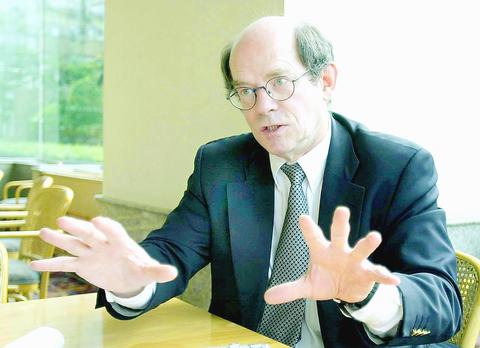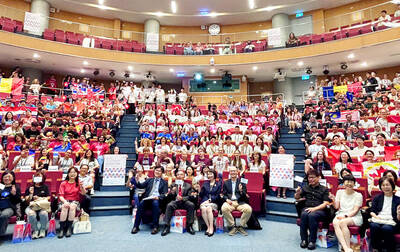Taipei Times: In light of the growing influence of globalization, to what extent do you think Taiwan can sustain its current "no haste, be patient" policy on managing capital flows from Taiwan to China?
Henri-Claude de Bettignies: I will be very careful not to make too many comments on Taiwan. But it seems to me that it would be very difficult to dramatically reduce the flow of investment from Taiwan to China. There is a net attraction toward the mainland here and one can understand why. There are so many opportunities in China. So many entrepreneurs here think that they can gain comparative advantage by just crossing over to China. There is a comparative advantage for the time being in developing businesses in China. So China is a magnet, a kind of Far West for Taiwan. You can try out new ventures, you can develop new manufacturing facilities and so forth. So it's very difficult to stop this.

PHOTO: CHIANG YING-YING, TAIPEI TIMES
Taiwanese have a great comparative advantage compared to others who try to invest in China. Because of your knowledge, your tradition, language and culture -- all this makes it less difficult to enter the Chinese market. And it is a very attractive comparative advantage.
The "go slow" [policy] ... what do you mean by go slow? We have to be careful when we say `go slow' because the world is changing fast, and if you go too slow, you will not jump on opportunities as they present themselves.
You see, the Japanese are going slow and they don't want change. Change is very difficult for them. And the consequence of this is that the Japanese [economy is] in a very bad situation.
Countries which are unwilling to accept the trend of change, I think, will have difficulty getting where they want to go. Because now the situation is such that you need to be flexible to react very quickly to the environment, and if you don't do that, you run the risk of being beaten by your competitor.
Of course we need to go fast with a sense of strategy [as to] where we want to go, a clear vision of the future. And if people have no vision, it'll be very difficult to develop an economy which will be competitive in the long term. So we need to develop a vision on where we want to go, and then we can discuss how to get there with a step-by-step approach. Of course we must not go too fast.
Look at China. China in a way is going very fast. The targeted annual economic growth rate of China is 7 percent. And that's quite a speedy transformation.
TT: Following China's accession to the WTO, what would be the distinctive social changes in China that you can foresee?
De Bettignies: The risk for China today is to underestimate the internal consequences of its entry into the WTO. China is assessing the benefits of its entry such as increased trade and investment. But I think the accession will have a huge consequence domestically.
For instance, it will worsen unemployment, as some companies will have difficulties remaining competitive. And if we have more unemployment, it creates more social problems. And if it creates more social problems, the government in Beijing will have tremendous difficulties in controlling the countryside. So how [Beijing] will be able to monitor this process of entry in a smooth way [is challenging] because the gap between the coastal areas and the west of the country is still very big. And if we have more and more unemployed people coming to Shanghai and Fujian, that is going to create more and more social friction, and that is going to be difficult.
Also, some of the regulations of the WTO are very demanding. So it requires a lot of courage on the part of the Chinese government to apply those regulations. We need to hope that the government will have the capacity to monitor this process carefully.
In terms of rules and regulations for transparency, these will put some pressures on corporate governance, on the way the companies present their results, [on some norms to empower shareholders]. There will be many pressures to have a more transparent system because the system today is not very transparent in China.
And I think China's WTO accession, by bringing more foreign investment, increased partnership, more strategic alliances and more joint ventures, will require an increase in transparency. And to modify the management system of the state-owned enterprises or town-and-village enterprises is something which is difficult to bring about, but it has to come.
There will also be consequences in terms of skills development. Because more and more foreign companies are likely to enter China, the shortage of professional skills that we see today will become even more visible. We will need more technicians, we will need more accountants and we will need more human resources managers.
To attract more foreign investment, companies need to have more professional skills. So that means one must accelerate the process of training and developing these human resources. In China there is no shortage of people. We have plenty of human resources, but we need more professional human resources at all levels of the organization. And the entry into the WTO will accelerate this need.

TAIWAN IS TAIWAN: US Representative Tom Tiffany said the amendment was not controversial, as ‘Taiwan is not — nor has it ever been — part of Communist China’ The US House of Representatives on Friday passed an amendment banning the US Department of Defense from creating, buying or displaying any map that shows Taiwan as part of the People’s Republic of China (PRC). The “Honest Maps” amendment was approved in a voice vote on Friday as part of the Department of Defense Appropriations Act for the 2026 fiscal year. The amendment prohibits using any funds from the act to create, buy or display maps that show Taiwan, Kinmen, Matsu, Penghu, Wuciou (烏坵), Green Island (綠島) or Orchid Island (Lanyu, 蘭嶼) as part of the PRC. The act includes US$831.5 billion in

The paramount chief of a volcanic island in Vanuatu yesterday said that he was “very impressed” by a UN court’s declaration that countries must tackle climate change. Vanuatu spearheaded the legal case at the International Court of Justice in The Hague, Netherlands, which on Wednesday ruled that countries have a duty to protect against the threat of a warming planet. “I’m very impressed,” George Bumseng, the top chief of the Pacific archipelago’s island of Ambrym, told reporters in the capital, Port Vila. “We have been waiting for this decision for a long time because we have been victims of this climate change for

Taiwan is hosting the International Linguistics Olympiad (IOL) for the first time, welcoming more than 400 young linguists from 43 nations to National Taiwan University (NTU). Deputy Minister of Education Chu Chun-chang (朱俊彰) said at the opening ceremony yesterday that language passes down knowledge and culture, and influences the way humankind thinks and understands the world. Taiwan is a multicultural and multilingual nation, with Mandarin Chinese, Taiwanese, Hakka, 16 indigenous languages and Taiwan Sign Language all used, Chu said. In addition, Taiwan promotes multilingual education, emphasizes the cultural significance of languages and supports the international mother language movement, he said. Taiwan has long participated

MASSIVE LOSS: If the next recall votes also fail, it would signal that the administration of President William Lai would continue to face strong resistance within the legislature The results of recall votes yesterday dealt a blow to the Democratic Progressive Party’s (DPP) efforts to overturn the opposition-controlled legislature, as all 24 Chinese Nationalist Party (KMT) lawmakers survived the recall bids. Backed by President William Lai’s (賴清德) DPP, civic groups led the recall drive, seeking to remove 31 out of 39 KMT lawmakers from the 113-seat legislature, in which the KMT and the Taiwan People’s Party (TPP) together hold a majority with 62 seats, while the DPP holds 51 seats. The scale of the recall elections was unprecedented, with another seven KMT lawmakers facing similar votes on Aug. 23. For a